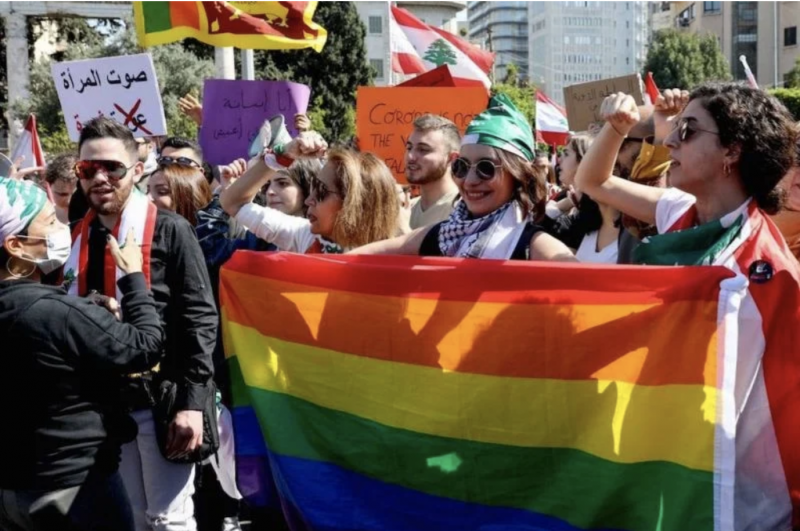
Supporters of Lebanon’s LGBT+ community carry at rainbow flag at a march on International Women’s Day 2020. (Credit: Anwar Amro/AFP)
BEIRUT– The head of the Beirut Bar Association, Nader Gaspard, has once again raised eyebrows for hosting the launch of a controversial book titled, The Crime of Homosexuality in Lebanese Law and Monotheistic Religions.
In his speech at the event, the book’s author, Salman Barakat, who is also a lawyer, declared to audience members that homosexuality poses a challenge to society and that it “negatively affects the ideas of individuals, and reflects on society in general, and on moral, literary, religious and intellectual values.”
Barakat said the book’s mission was to investigate if homosexuality was “normal or pathological” and whether it should be considered a punishable crime or permissible under Lebanese law. The author claimed that he wrote the book after doing scientific and legal research.
The Lebanese Psychiatric Society and the Lebanese Psychological Association ruled in 2013 that homosexuality is not a disease and does not require a cure.
The book is divided into two parts: the first tackles the literature on “homosexuality” and whether it is normal or pathological. It also deals with “the moral, psychological and health-related side effects of homosexuality.” The author also presents the religious positions of all three Abrahamic religions on the subject.
In a Jan. 24 interview with the Associated Press, Pope Francis said: “Being homosexual is not a crime,” but cited official teachings of the Catholic Church declaring same-sex activity to be “sinful.”
The book, Barakat added, also discusses the alleged legality of homosexuality around the world and in Lebanon. He noted that he did not find any specific provision in the Lebanese Penal Code that specifically criminalizes homosexuality, besides article 534 of the Lebanese Penal Code which “prohibits any sexual intercourse that contradicts the law of nature,” and is punishable by a prison sentence of up to one year.
Article 534 of the penal code is often used to criminalize non-heteronormative relationships.
Although Barakat acknowledged that this does not criminalize homosexuality, per se, he said that the Lebanese Judiciary relies on it when ruling on certain court cases involving homosexuality. Barakat noted that in recent years, there have been instances where judges decided not to rule that sexual intercourse between same-sex couples was against the laws of nature.
In the second part of the book, Barakat explained that he discusses the position of religious officials and institutions on homosexuality.
He also lists a number of recommendations to “reduce the spread of homosexuality in Lebanon.”
The recommendations include amending Article 534 to explicitly criminalize homosexuality and prohibit meetings that “encourage homosexuality,” especially those organized by NGOs.
Gaspard said that anyone writing about homosexuality needs to take into account “religious, ethical, legal, and societal principles,” adding that Barakat had done that and reached his own conclusions. As to whether or not these conclusions are valid, Gaspard said that “we will have to see in the coming days.”
The event follows a sling of controversies involving Gaspard, which include controversial comments made at a symposium on domestic violence. At the conference, Gaspard said: “What prevents [women] from stabbing themselves or hitting their heads against the wall and saying that they are being beaten?”
Most recently, Gaspard has been under fire for restricting lawyers from speaking to the media without his prior authorization. The decision was met with public outrage and was challenged in court by lawyer Nizar Saghieh at the Beirut Court of Appeals. Saghieh said the decision was a violation of the freedom of expression guaranteed under the Constitution.
Saghieh was later asked to appear in front of the Bar’s council for questioning and could face disbarment. Maya Zaghrini, a member of the Bar Council, told L'Orient-Le Jour at the time that “the summons of Saghieh is not related to the new rule that a lawyer cannot make media appearances without prior authorization of the President of the Bar.”
The book launch comes amidst renewed attacks against the LGBTQ+ community.
In February 2023, Human Rights Watch released a report detailing how governments across the MENA region, including Lebanon, use social media to both entrap and extort LGTBQ+ individuals.
This also comes amid repeated attacks on the community by political leaders including the caretaker interior minister and Hezbollah leader Hassan Nasrallah.
A recent investigation by L’Orient-Le Jour detailed multiple accusations of harmful “conversion therapy” courses run by Lebanese churches and other religious leaders targeting LGBTQ+ individuals.